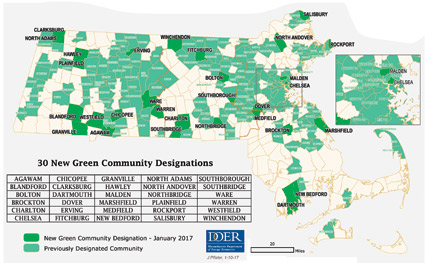3/3/2017
| G. Michael Dobbs
news@thereminder.com
Category: March 2017

This map outlines the 185 communities that have achieved the Green Community designation from the state. Agawam was one of 30 communities to receive the distinction to start 2017.
Reminder Publications submitted photo
The town of Agawam was recently included in a group of 30 municipalities statewide to be granted Green Community status by the Massachusetts Executive office of Energy and Environmental Affairs’ Department of Energy Resources, a designation that will give the town the opportunity to take advantage of funding for energy-saving and environmentally conscious initiatives.
“We’re very happy to have been designated a Massachusetts Green Community,” Mayor Richard Cohen said. “It’s free money and the free money helps us save money, so it’s 100 percent win-win.”
Cohen noted the Green Communities initiative has been heavily supported by Gov.Charlie Baker’s administration, which has put an emphasis on collaboration between the state and its cities and towns. In addition to the support for Green Community program, Cohen pointed to the Community Compact Agreements being signed around the state as a sign of the governor’s dedication to that concept.
Baker echoed those sentiments in the state’s announcement of the new Green Communities.
“The Green Communities program is an excellent example of how state and local governments can work together to save taxpayer money and promote responsible energy policies,” he said. “The thirty new Green Communities named today will now have additional resources to invest in energy efficiency and renewable energy, locking in energy savings for residents and reducing their carbon footprints.”
In order to qualify for the program, which now includes 185 of the state’s 351 cities and towns, Agawam had to meet five criteria – provide “as of right siting and designated locations” for renewable energy generation, research and development, or manufacturing facilities; create an expedited application permitting process for renewable energy facilities; reduce energy usage by 20 percent over five years; purchase energy efficient vehicles; and adopt the state stretch energy code for municipal buildings.
Cohen noted that while the town had been making environmentally conscious choices already, the final criteria, the Stretch Energy Code, had been the town’s biggest hurdle. It wasn’t until it was brought to the City Council for a fifth time that the code was approved.
The stretch code imposed additional burdens and requirements on new construction that would enhance energy efficiency of the buildings,” Marc Strange, director of Planning and Community Development explained. “Over time the building code in and of itself has become more energy efficient and more energy conscious and has gotten closer and closer to the stretch code. The most recent iteration of the building code was so close to the stretch code, it basically just made it a formality.”
A letter from Green Communities Division Deputy Director Joanne Bissetta confirming Agawam’s inclusion in the Green Communities program said the fact the community had met all of the requirements “is proof of Agawam’s position as an energy leader in Massachusetts, poised to reduce its energy costs, improve the local environment and implement energy efficiency and renewable energy projects.”
In becoming a Green Community, Agawam also received a grant of $207,970 for future green initiatives. The city would have to submit a project application outlining how the grant would be spend to receive the funding.
Cohen explained the city’s priority would be improving municipal buildings in order to increase their energy efficiency, which in turn, he said, would reduce costs and the burden on taxpayers.
First on the docket would be the city’s school buildings.
“We’ve done a lot of work in the schools already, which can be seen in the energy audit that we just did and had to submit in order to become a green community,” Cohen said. “We’ve done a lot, but this will allow us to look at control systems, boilers and things of that nature.”
Cohen added James Clark School and Roberta G. Doering Middle School would be the targets for the first round of funding.
“We’ve partnered with Advanced Energy Group and Eversource who are already doing audits as we speak. They have completed the audits Clark and Robinson and Phelps,” he said. “They’re looking at all of the buildings and coming up with a plan, but the two schools we’re going to be applying for first are Clark and Doering.”
He added the city is also taking advantage of a Massachusetts School Building Authority grant to replace the boilers at Doering, which would yield a savings of nearly $500,000.
“So along with the energy audits and the Green Community money, we have been able to use MSBA money to make our schools energy efficient,” he said.
The decision to place an emphasis on improving municipal buildings came at the suggestion of Advanced Energy Group, who explained those projects would yield the highest level of savings and give Agawam “the biggest bang for its buck,” Cohen explained.
He also pointed out that he has a long-term goal of converting the city’s lighting to LED. He admitted it was an expensive proposition, but one that could be achieved with support from the state as a Green Community.
“When we do replace lights, we’re currently replacing them with LED, but to do it on a much larger scale would be extremely, extremely expensive,” he said. “It’s a project worth doing because in the end it will be more savings for the taxpayers, but we have to make sure we do the right thing and use the money we’re getting as a Green Community wisely.”
For more information on the Green Communities initiative, visit www.mass.gov/eea/energy-utilities-clean-tech/green-communities/gc-grant-program.
Share this: